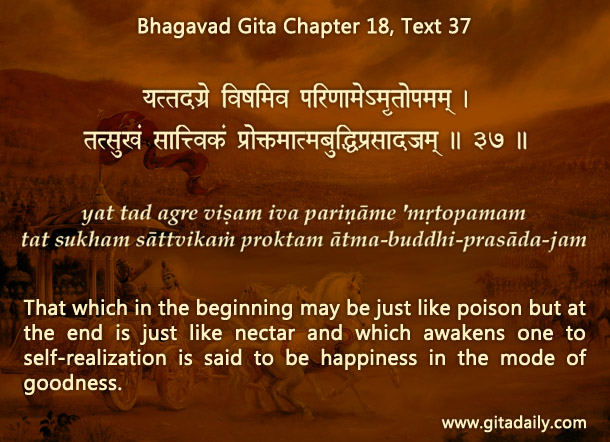When we practice spiritual life, our mind holds us back by making us feel that the effort is too much and the reward too little.
This feeling is to some extent rooted in reality. The Bhagavad-gita (18.37) indicates that sublime joys taste like poison initially and nectar eventually. Enduring and endeavoring through the poison phase is no doubt a struggle. Saying no to worldly temptations and distractions can seem like a torture of self-denial.
But the mind misleads us about the magnitudes of the poison and the nectar. The poison is the austerity of giving up anti-devotional sensual pleasures that come from our periphery, our bodily shell. In contrast, the nectar of connecting with Krishna is far greater, deeper and richer. Why? Because that joy stems from our innermost core, our identity as souls, parts of Krishna, who is the source of unlimited pleasure.
Moreover, worldly pleasures are inherently temporary, whereas in the case of spiritual joys, only the initial poison phase is temporary. Though the mind makes us imagine that the poison phase is interminably long, actually the poison soon gives way to nectar if we just determinedly persevere in devotion.
Vital for such perseverance is our intelligence because it enables us to see beyond the initial poison to the eventual nectar. And our intelligence is sustained by regular study of scripture, for such study strengthens and sharpens our discerning capacity. Additionally, when we study in a mood of service to Krishna, it attracts his mercy in the form of insight. Thus, our intelligence becomes not just intellectual but also devotional. And the purer we become by consistent practice of bhakti, the more the initial poison phase shortens and the more spiritual happiness becomes quickly accessible. Thus, we go beyond the poison to increasingly relish the nectar.

Explanation of article:
https://www.youtube.com/watch?v=Icq8OmcHtTY

Leave A Comment